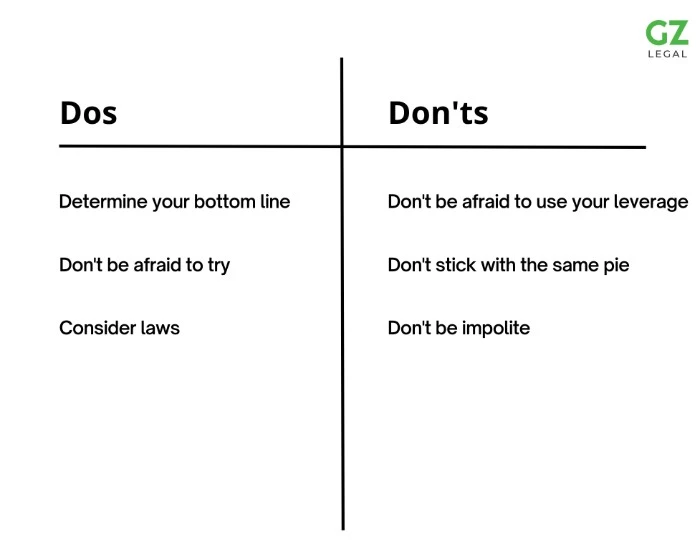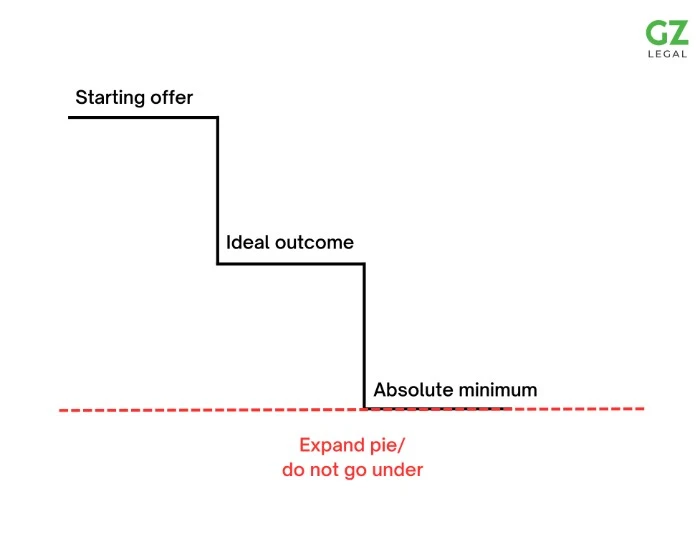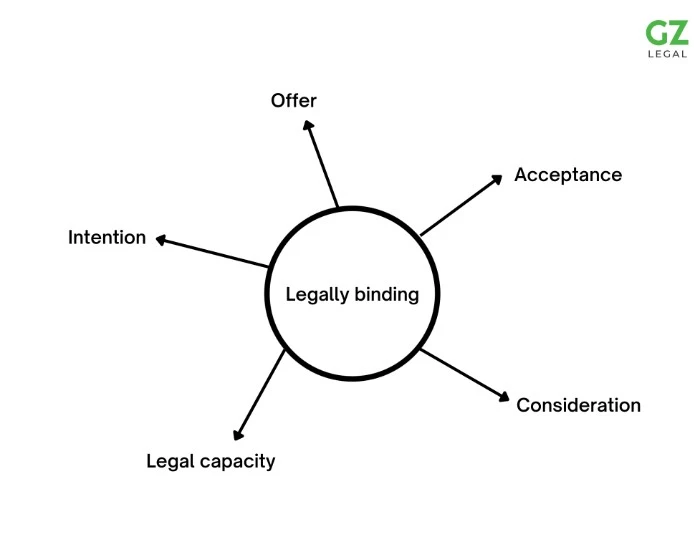Malcolm ZoppiSun Oct 15 2023
Tips for Negotiating Legal Contracts (3 Dos and 3 Don’ts)
Negotiating a business contract can feel pressuring and daunting.

Introduction
Negotiating a business contract can feel pressuring and daunting. You may be afraid that you will jeopardise the business relationship between your company and the other party involved, or feel insecure when facing experienced negotiators (such as lawyers, local counsel or a managing attorney).
These feelings are valid, although negotiation has little to do with confrontation and more to do with problem-solving. For this, before starting the negotiation process, attempt to shift your mindset to recognise negotiations as a useful means to jointly find solutions.
Successful Negotiations: 3 Dos
Preparation & attitude is key to having successful negotiations. Read below the top three ‘Dos’ and top three ‘Don’ts’ of contract negotiations.

1. Determine your bottom line before the negotiations start
A well-negotiated agreement contains contract terms that accurately reflect the needs, rights, obligations, risks and liabilities of the parties.
For this, in preparation for your negotiations, make sure to privately write down the following:
- Your absolute minimum requirements for the relationship to succeed;
- The maximum you are willing to give in return for the above-mentioned minimum requirements;
- The ideal outcome of the negotiations; and
- Your starting offer.
Your absolute minimum requirements for the relationship to succeed could include things like payment terms, pricing, deadlines and delivery dates. If there are any non-negotiable items in your agreement that you are willing to compromise on if necessary, make sure to note this as well.
The maximum you are willing to give in return for the above-mentioned minimum requirements could include either a concession or the addition of a benefit, such as additional services or other forms of compensation.

The ideal outcome of the negotiations is to ensure that both parties reach an agreement that is fair, equitable and provides mutual benefits. This should be based on the needs, rights and obligations of all involved, and it should be tailored to the specific circumstances of each agreement.
Your starting offer is the point at which you are willing to begin negotiations, and it should be higher than your ideal outcome. It’s important to remember that even if you don’t get exactly what you’ve initially asked for in a negotiation, it does not make the negotiation unsuccessful. Instead, use the starting offer as a way to ‘anchor’ the negotiation, allowing for the communications to revolve around that initial anchor.
2. Don’t be afraid to try
As the saying goes, if you don’t ask you won’t get.
The biggest mistake business owners do when it comes to negotiations is not trying at all.
At GZ Legal, we believe that everything is negotiable. For this, the second tip we give you is to give negotiations a good try.
As a general principle, any time spent negotiating is time well-spent. Even if the outcome isn’t what you initially hoped for, you can use the negotiation as a learning experience.
Remember that there is often room for compromise and agreement in any contract – use this to your advantage. If you take a proactive approach to negotiations, your chances of success increase significantly. Our team of experienced legal professionals are here to guide you through the process and help you get the best possible outcome.
We believe in a client-first approach. Rely on our team to ensure that you have a satisfactory agreement. With GZ Legal, anything is negotiable – so don’t be afraid to try!
3. Consider laws & legal principles
Below we outline three main legal considerations when it comes to negotiating business contracts.
Legally binding
Firstly, to avoid the agreement not being legally binding, you need to ensure that the contract’s terms satisfy the elements of a legally-binding contract according to contract law.
In short, a legally binding agreement has the following elements:
- Offer;
- Acceptance;
- Consideration (something of value exchanged between both parties)
- Legal capacity (an agreement made by people who have the legal authority to do so); and
- Intention to create a legally binding obligation.

Legal compliance
Second, you should also familiarise yourself with other laws that may apply to your negotiations, such as regulatory requirements and compliance with any applicable laws (such as the UK GDPR and the Companies Act 2006). Contact us if you would like support. At least one party to the negotiations must be able to determine whether the agreement complies with regulatory standards. The last thing you want to happen is for you to meet the other side’s negotiator in court due to bad legal compliance.
Automatic rejection of offers
Third, if the other side makes you an offer and you respond with a counteroffer, the original offer made by the other party is deemed ‘rejected.’ This means that you cannot later return to that original offer by accepting it whilst expecting the other side to be bound by it. The business contract that you are negotiating will be made up of many different terms and conditions. For this, always make sure to consider how your response to the other side’s offer may affect the rest of the contract terms that have been discussed.
Unsuccessful Negotiations: 3 Don’ts
1. Don’t be afraid to use your leverage
Often, parties do not make full use of the leverage that they have at their disposal. Unethical practices should not be deployed, but a recognition of the strengths of your situation can be effective at enabling the parties to ‘be on the same page.’ Using your bargaining power is useful because it can help secure the desired outcome. Furthermore, it will help other parties consider all factors that affect the ability to reach an agreement and move forward.
2. Don’t stick with the same pie
Being pragmatic and ‘expanding the pie’ is critical when negotiating.
Often, business owners believe that to receive something, the other party must lose it. Instead, a solutions-centric approach should be taken. Consider ways to create value for all parties, as opposed to taking something away. Negotiations can be viewed not just as a zero-sum game, but also as a cooperative process to enhance benefits on both sides.
When expanding the pie, it’s important to understand the interests and objectives of each party and build on that foundation. It’s possible to come up with alternatives to replace existing items in a contract or create new ones. As you focus on building value for each party, the negotiation process can become much smoother and more successful. Ultimately, a business contract should serve to help the parties to fulfil their intended goals by enabling results: the starting point of the negotiations may be less important.

3. Don’t be impolite
The other party will find it very difficult to agree with you if you are being impolite. This is because people want to feel as if they have won. If you act impolitely and rudely to undermine their confidence, any compromise will feel like a loss to them. For this, they will be less likely to agree with any of your offers.
Further, when negotiating, it is important to remain open-minded and flexible. It is unlikely that the other party will agree with all of your requests – so make sure you are willing to compromise to reach an agreement. If you are too rigid in your demands, the other side may not offer anything that is mutually beneficial.
Conclusion
In conclusion, the key to successful negotiations is to ensure you consider all legal considerations and understand the laws that may apply. It is also important to use your leverage cautiously and remain polite with the other party. Furthermore, ‘expanding the pie’ can be beneficial in creating value for both parties involved in a contract negotiation. By following these pointers, you can ensure that the negotiation process is successful and results in a favourable outcome.
By understanding the basics of negotiating a legal contract, you can better protect yourself and your business interests. With an experienced negotiator on your side, such as those at our law firm, you increase the possibility of achieving success. Contact us for further advice and assistance in ensuring that your negotiations are successful.
Find out more!
If you want to read more in this subject area, you might find some of our other blogs interesting:
- Step-by-Step Guide on How to Transfer Shares to a Holding Company
- Breach of Settlement Agreement: Consequences and Remedies Explained
- Who Gets the Money When a Company is Sold?
- What is a Counter Offer in Contract Law? Explained Simply and Clearly
- Understanding the Costs: How Much Do Injunctions Cost in the UK?